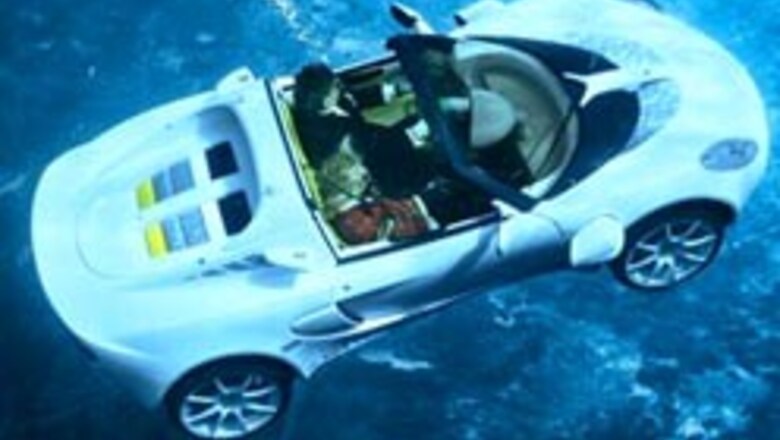
views
Geneva: Okay, so the Swiss have invented a car that runs on land and underwater. But did they really have to make it a convertible?
It's called the "sQuba", and conjures up memories of James Bond's amphibious Lotus Esprit from The Spy Who Loved Me. That fictional vehicle traveled on land and, when chased by bad guys in a helicopter, plunged into the water and became an airtight submarine — complete with "torpedoes" and "depth charges."
But "Q" isn't responsible for this one.
The concept car — which unlike Bond's is not armed — was developed by Swiss designer Rinspeed Inc. and is set to make a splash at the Geneva Auto Show next month.
Company CEO Frank Rinderknecht, a self-professed Bond fan, said he has been waiting 30 years to recreate the car he saw Roger Moore use to drive off of a dock.
The sQuba can plow through the water at a depth of 30 feet and has electrical motors to turn the underwater screw.
You'll have to break out the wetsuit, however.
The car has an open top, meaning that the two passengers are exposed to the elements.
"For safety reasons, we have built the vehicle as an open car so that the occupants can get out quickly in an emergency," said Rinderknecht, 52.
Passengers will be able to keep breathing underwater through an integrated tank of compressed air similar to what is used in scuba diving.
The sQuba's top speed on land is about 77 mph, but it slows down to 3 mph on the surface of the water, and 1.8 mph underwater.
Working with engineering specialists, Rinspeed removed the combustion engine from a sports car and replaced it with several electrical motors. Three are located in the rear — er, aft — with one providing propulsion on land and the other two driving the screw for underwater driving.
"We always want to do cars that are outrageous, which nobody has done before. So we thought, 'Let's make a car dive,'" said Rinderknecht, whose innovative company has made transparent, flying and voice-activated cars in previous attention-grabbing displays at the Geneva Auto Show.
The company calls the sQuba the first real submersible car. Unlike military amphibious vehicles, which can only drive slowly on a lakebed, the sQuba travels like a submarine — either on the surface or submerged.
The interior is resistant to salt water, allowing the skipper to drive into a lake or the sea.
"Many concept cars introduce important new technology," said John Cabaniss at the Association of International Automobile Manufacturers in Washington. "Anything to improve the efficiency of a vehicle, streamlining or reducing the weight of materials, while maintaining strength ... is put into concept cars first."
Cabaniss said the lithium-ion batteries in Rinspeed's car were "state-of-the-art" and added that the car industry in general would be looking for more ways to make things work electronically. But he was skeptical of the overriding idea.
"Other than some kind of a movie situation, for Bond-like stuff with lots of gimmicks, I can't imagine it will have any practical value," Cabaniss said. "Maybe people will need to go from land to water, and traverse a body of water, but underwater? Especially as it gets your suit wet."
Rinderknecht said it cost more than $1.5 million to make the sole sQuba in existence, and that it was difficult to make a car watertight and pressure-resistant enough to be maneuverable underwater.
"The real challenge, however, was to create a submersible car that moves like a fish in water," he added.
Rinspeed is in discussion with commercial manufacturers about making a limited number of the cars. The price? "It would be cheaper than a Rolls-Royce," he said. A 2008 Rolls-Royce Phantom Drophead Coupe has a sticker price of more than $400,000.
Rinderknecht said it was unlikely that people would soon spot the sQuba tolling down the highway or popping up in your nearby lake.
"They might sell as toys for rich people, perhaps," he said. "I don't see mass transportation switching to cars that dive."



















Comments
0 comment